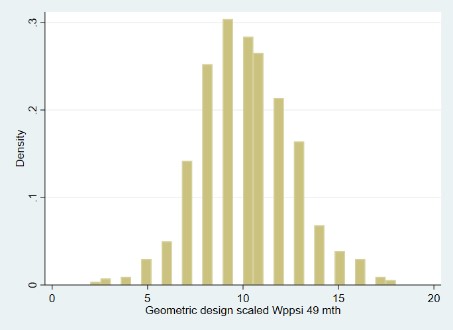The Avon Longitudinal Study of Parents and Children (ALSPAC) assessed their cohort members (CMs) at 49 months’ age (Children in Focus Clinic) using the Geometric Design measure from the Wechsler Preschool and Primary Scale of Intelligence Revised (WPPSI-RUK).
Details on this measure and the data collected from the CMs are outlined in the table below.
| Year of data collection: | 1996-1997 |
| Domain: | Non-verbal ability |
| Measures: | Visual recognition |
| Spatial visualisation | |
| Visual organisation | |
| Visual-motor coordination | |
| Fine-motor ability/finger dexterity | |
| Simultaneous processing | |
| CHC: | Gv (Visual Processing) |
| CLOSER Source: | Explore this sweep in CLOSER Discovery: ALSPAC Early Years (13 months to 4 years 11 months) (opens in a new tab) |
| Administration method: | Trained interviewer; clinical setting; pen and paper |
| Procedure: | The child was presented with a stimulus booklet, and pen and paper. The subtest contains two sections: i) first, they were asked to match a pictured design from an array of four designs (items 1-8 in picture booklet) and ii) they were required to copy a geometric figure from a printed model (items 9-16 in picture booklet). Encouragement (e.g. "do your best"), but no assistance, was provided. There was no fixed time limit for this subtest. The first 8 items were scored at one point each, the last eight items were worth 4 points for a total raw score of 57 points. |
| Link to questionnaire: | http://www.bristol.ac.uk/alspac/researchers/our-data/clinical-measures/ (opens in new tab) |
| Scoring: | Standardised score (M = 10, SD = 3) |
| Item-level variable(s): | Not readily available |
| Total score/derived variable(s): | cf802 Explore this variable in Discovery: ALSPAC Children in Focus 4Mth-61Mth Clinics Dataset (opens in a new tab) |
| Descriptives: | Raw score |
| N = 1,018 | |
| Range = 2 - 18 | |
| Mean = 10.11 | |
| SD = 2.48 | |
(click image to enlarge) |
|
| Age of participants (weeks): | Mean = 212.39 weeks, SD = 1.63, Range = 207-221 |
| Other sweep and/or cohort: | None |
| Source: | Wechsler, D. (1989). Wechsler Preschool and Primary Scale of Intelligence-Revised. WPPSI-R. Psychological Corporation. |
| Technical resources: | Kaufman, A. S., & Lichtenberger, E. O. (2000). Essentials of WISC-III and WPPSI-R Assessment. John Wiley & Sons Inc. |
| Example articles: | Gathercole, S. E., Briscoe, J., Thorn, A., Tiffany, C., & ALSPAC Study Team. (2008). Deficits in verbal long-term memory and learning in children with poor phonological short-term memory skills. The Quarterly Journal of Experimental Psychology, 61(3), 474-490. |
| Taylor, C. M., Kordas, K., Golding, J., & Emond, A. M. (2017). Data relating to prenatal lead exposure and child IQ at 4 and 8 years old in the Avon Longitudinal Study of Parents and Children. Neurotoxicology, 62, 224-230. |
For the named item in the table above, a link is provided to the corresponding CLOSER Discovery content.
Go to:
- Overview of all cognitive measures in ALSPAC
- Overview of childhood cognitive measures across all studies
This page is part of CLOSER’s ‘A guide to the cognitive measures in five British birth cohort studies’.
